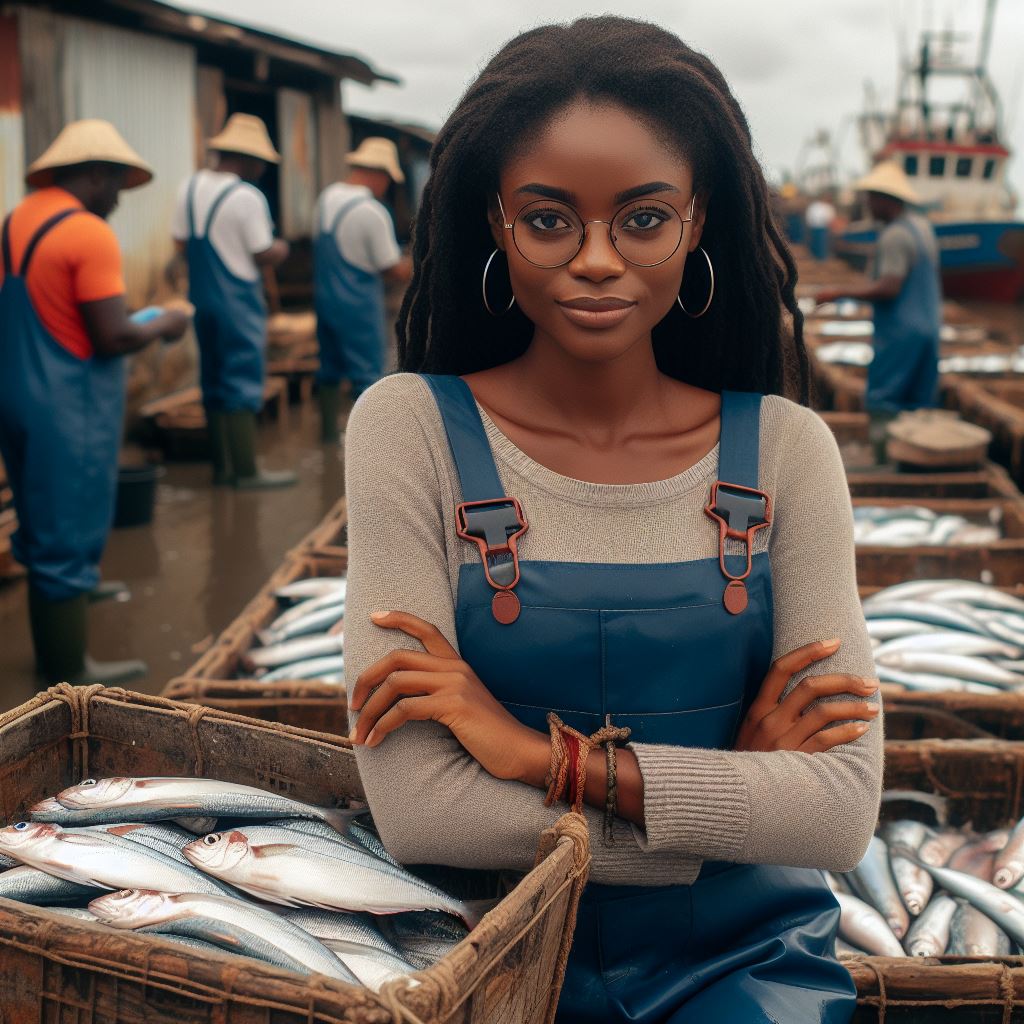Introduction
Nigerian Traditional Fishing and Modern Techniques: Nigeria’s traditional fishing methods have been essential to its culture and economy for centuries.
The country’s rich fishing traditions are deeply rooted in its diverse and abundant water resources.
Fishing plays a vital role in providing food, employment, and income to many Nigerians.
Traditional fishing techniques are passed down through generations, reflecting the unique cultural heritage of each region.
These methods vary from using simple tools like nets and traps to more complex techniques like canoe fishing.
Nigerian fishermen possess a deep knowledge of their local ecosystems, allowing them to sustainably harvest fish and maintain the delicate balance of nature.
However, with the advent of modern technology, traditional fishing practices face challenges.
Industrialization and pollution threaten Nigeria’s aquatic ecosystems, leading to declining fish populations.
To combat this, the Nigerian government has introduced modern fishing techniques, such as trawling and aquaculture, to boost production and ensure food security.
While these methods have increased efficiency, they have also raised concerns about overfishing and environmental degradation.
It is crucial to strike a balance between traditional and modern fishing practices to preserve Nigerian cultural heritage while ensuring sustainable fishing practices.
Through education, regulation, and community involvement, Nigeria can safeguard its fishing traditions and protect its valuable aquatic resources for future generations.
Overview of traditional fishing techniques in Nigeria
Traditional fishing methods passed down through generations
Traditional fishing techniques in Nigeria have a rich history that dates back generations.
These methods have been passed down through the years, ensuring that the knowledge is preserved and used in sustainable fishing practices.
One of the key aspects of traditional fishing techniques in Nigeria is the use of simple tools. Fishermen rely on nets, traps, and hooks to catch their prey.
These tools are crafted using local materials and are designed to be effective in their purpose.
Nets are commonly used in Nigeria for fishing. They are made of strong fibers and are used to trap fish in the water.
These nets are often cast into the sea or rivers, and fishermen wait patiently for the fish to get entangled in the mesh.
Use of simple tools such as nets, traps, and hooks
Traps are another commonly used tool in traditional fishing. These are designed to lure fish into a confined area, where they become trapped and can easily be caught.
Fishermen strategically place these traps in areas with high fish populations to maximize their catch.
Hooks are also used in traditional fishing techniques.
These are attached to fishing lines and baited to attract fish. Fishermen carefully lower the hooks into the water, hoping to lure a fish to bite and become caught.
The use of these simple tools has been practiced for generations and has proven to be effective in catching fish.
The knowledge of how to use these tools has been passed down from older fishermen to younger generations, ensuring that the traditional fishing methods continue to be used and perfected.
Role of traditional knowledge in sustainable fishing practices
Traditional knowledge plays a crucial role in sustainable fishing practices.
The knowledge and experience passed down through generations enable fishermen to understand the behavior and habits of fish, as well as the best times and locations for fishing.
This allows them to fish in a way that minimizes harm to the fish populations and the environment.
In addition to using the right tools and techniques, traditional fishermen in Nigeria also have a deep understanding of the ecosystem they operate in.
They are aware of the breeding seasons for different species of fish and avoid fishing during these times to allow for reproduction and replenishment of fish stocks.
Moreover, traditional fishermen in Nigeria practice a form of community-based fishing.
They often work together in groups, sharing their knowledge and resources to increase their chances of a successful catch.
This collaborative approach promotes sustainability, as it helps prevent overfishing in specific areas.
In fact, traditional fishing techniques in Nigeria rely on simple tools such as nets, traps, and hooks.
The knowledge and expertise passed down through generations allow fishermen to practice sustainable fishing, respecting the environment and the natural behavior of the fish.
This traditional knowledge is invaluable and must be preserved and appreciated for the sake of both the fishing communities and the natural resources they rely on.
Read: Collaborative Projects: Nigeria’s Fisheries Global Partnerships
Traditional Fishing Practices in Different Regions of Nigeria
In the tapestry of Nigeria’s rich cultural heritage, traditional fishing practices weave a narrative that spans generations.
From the coastal regions to riverine communities, and inland lakes to reservoirs, each locale tells a unique story through its time-honored fishing techniques.
Nigeria’s vast landscape mirrors its diversity in traditional fishing methods.
Along the coast, where the rhythmic dance of the waves meets the shore, fishermen deploy time-tested techniques passed down through generations.
Transform Your Career with Expert Guidance
Get personalized mentorship consulting that’s tailored to your unique path. Our expert advice is actionable and exclusive.
Get StartedHandwoven nets, a craft perfected over centuries, are cast into the sea with precision, capturing an abundance of marine life while maintaining ecological balance.
Description of Fishing Techniques Used in Coastal Areas
Coastal communities harness the power of the tides, employing techniques such as beach seining and cast netting.
In beach seining, a group of fishermen wades into the surf, drawing a seine net in a strategic pattern to trap schools of fish.
Cast netting, on the other hand, involves skillfully throwing a circular net from the shore, creating a graceful arc that envelops unsuspecting fish beneath its mesh.
Methods Used in Riverine Communities
Journeying inland to the labyrinthine river networks, traditional methods take on a new dimension.
Handmade traps, fashioned from locally sourced materials, are strategically placed to intercept the flow of river currents.
The rhythm of life in these riverine communities is synchronized with the ebb and flow of water, as fishing becomes not just a livelihood but a way of existence.
Insight into Fishing Practices in Inland Lakes and Reservoirs
Inland lakes and reservoirs tell a tale of adaptation. Here, fishermen utilize canoes carved from sturdy wood, navigating the still waters in search of a piscatorial bounty.
Gill nets and hook-and-line methods come to the fore, as these inland ecosystems demand a nuanced approach to fishing.
As we delve into Nigeria’s diverse fishing techniques, the intricate web of tradition and adaptation becomes apparent.
From the rhythmic waves of the coast to the meandering rivers and tranquil lakes, the link between Nigerian traditional fishing and modern techniques is a testament to the resilience of a culture deeply rooted in its aquatic surroundings.
Read: Emerging Trends in Nigerian Fisheries Research and Study
Challenges faced by Nigerian traditional fishermen
In the bustling Nigerian fishing industry, traditional fishermen face numerous challenges.
These difficulties have a profound impact on their livelihood and the sustainability of fish populations.
One key challenge is the environmental degradation, which adversely affects the fish habitats.
Deforestation, pollution, and climate change have all contributed to a decline in fish populations.
Overfishing by large-scale commercial operations also poses a significant challenge to traditional fishermen.
These companies have advanced technology and resources that allow them to catch fish in massive quantities, leaving little for the traditional fishermen who rely on small-scale fishing methods.
The competition is fierce, and the traditional fishermen struggle to compete in a market dominated by industrial fishing.
Another challenge faced by Nigerian traditional fishermen is the lack of government support. Many of these communities operate with minimal assistance or protection from authorities.
They lack access to modern equipment, facilities, and government-provided incentives that would enable them to upscale their operations and compete on a level playing field.
As a result, they often struggle to meet the demands of an evolving fishing industry.
Impact of environmental degradation on fish populations
The impact of these challenges on traditional fishermen is severe. Without adequate support and resources, they find it increasingly difficult to make a living from fishing.
Many are forced to explore alternative livelihood options or migrate to cities in search of better opportunities.
This phenomenon has led to a decline in traditional fishing communities and a loss of cultural heritage.
Competition from large-scale commercial fishing operations
Additionally, the decline in fish populations due to environmental degradation and overfishing has far-reaching consequences.
Fish provide a vital source of protein and essential nutrients for millions of Nigerians.
The scarcity of fish not only affects the food security of local communities but also drives up prices, making it more difficult for vulnerable populations to access nutritious food.
To address these challenges and support traditional fishing communities, the Nigerian government needs to take proactive measures.
Firstly, there should be strict regulations and enforcement against environmental degradation, including penalties for those responsible.
This will help protect fish habitats and ensure the sustainability of fish populations.
Lack of government support for traditional fishing communities
Secondly, the government should provide financial and technical support to traditional fishermen.
This can be in the form of low-interest loans to invest in modern fishing equipment, training programs to enhance their fishing techniques, and access to markets for fair and equitable trade.
Additionally, creating cooperative networks among fishermen can enable them to pool resources, negotiate better prices, and collectively address their challenges.
Lastly, the government should prioritize the inclusion of traditional fishing communities in policy and decision-making processes.
Their knowledge and experience in sustainable fishing practices should be recognized and utilized to develop effective strategies for fish conservation and management.
In essence, Nigerian traditional fishermen face significant challenges that threaten their livelihoods and the sustainability of fish populations.
Environmental degradation, competition from large-scale fishing operations, and lack of government support all contribute to these challenges.
It is crucial for the Nigerian government to take proactive measures to address these issues and ensure the survival of traditional fishing communities and the sustainability of fish populations.
Read: Fisheries Curriculum: Key Courses to Expect in Nigeria

Introduction of modern fishing techniques in Nigeria
In the vast waters of Nigeria, where tradition and modernity intertwine, the age-old practice of fishing has undergone a transformative journey.
As technology continues to reshape the world, Nigeria’s traditional fishing communities are embracing modern techniques to ensure sustainable and efficient practices.
Adoption of Motorized Boats and Modern Fishing Gear
Gone are the days of hand-carved canoes navigating the waterways. Nigerian fishermen have shifted towards motorized boats, enabling them to cover larger areas in shorter time spans.
This transition has not only increased the catch but has also reduced the physical strain on the fishermen.
Modern fishing gear, crafted from durable materials, has replaced traditional tools, enhancing the durability and efficiency of the equipment.
Use of Fish Finders and Sonar Technology
In the heart of this transformation lies the incorporation of cutting-edge technology. Fish finders and sonar technology have become indispensable tools for Nigerian fishermen.
These devices allow them to explore the underwater terrain, locating schools of fish with precision.
The once uncertain waters now reveal their secrets, leading to more strategic fishing and minimizing the impact on the ecosystem.
Incorporation of Commercial Fishing Practices
Traditionally, fishing in Nigeria was a community affair, deeply ingrained in cultural practices.
However, the influx of modern techniques has led to the incorporation of commercial fishing practices in these tight-knit communities.
Cooperative efforts now extend beyond traditional boundaries as fishermen collaborate to invest in larger boats and shared equipment.
This shift has not only increased productivity but has also opened new avenues for economic growth within these communities.
As Nigeria navigates the delicate balance between tradition and progress, the evolution of fishing techniques stands as a testament to the resilience of its communities.
The integration of modern methods ensures a sustainable future for both fishermen and the environment.
In this dynamic journey, Nigeria’s waters bear witness to the harmonious coexistence of tradition and innovation, creating a thriving legacy for generations to come.
Read: Impact of Cultural Practices on Consumer Sciences in Nigeria
Impact of modern techniques on Nigerian traditional fishing
Nigeria, a country with a rich fishing culture, has experienced significant changes due to the introduction of modern fishing techniques.
Changes in fishing culture and traditional knowledge
These changes have not only affected the fishing culture and traditional knowledge but also have ecological and socioeconomic implications for the traditional fishing communities.
The fishing culture in Nigeria has deep roots in traditional knowledge and practices that have been passed down through generations.
However, the advent of modern fishing techniques has led to a decline in the reliance on traditional methods.
Traditional knowledge, once the backbone of fishing practices, is gradually being forgotten and replaced by modern approaches.
This shift has resulted in a loss of valuable information about local fish species, breeding patterns, and migration routes.
As a consequence, traditional ecological knowledge is on the verge of extinction.
Ecological consequences of modern fishing methods
The introduction of modern fishing methods has also had detrimental ecological consequences.
Traditional fishing practices, such as using small boats and nets, ensured a sustainable harvest that preserved the delicate balance of aquatic ecosystems.
However, modern techniques, such as large-scale trawling and the use of dynamite, have caused severe damage to the environment.
These destructive practices have resulted in overfishing, habitat destruction, and the depletion of fish stocks.
The delicate balance in aquatic ecosystems has been disrupted, leading to the decline of certain fish species and the loss of biodiversity.
This has severe implications for the overall health and productivity of Nigeria’s waters.
Socioeconomic implications for traditional fishing communities
Moreover, the socioeconomic implications for traditional fishing communities have been profound.
The introduction of modern techniques has led to the concentration of fishing activities in certain areas, leaving traditional fishing communities marginalized.
Modern methods, often requiring large investments and specialized equipment, favor those with financial resources and exclude small-scale fishers.
This has resulted in a widening income gap and increased poverty among traditional fishing communities.
Furthermore, the decline in fish stocks due to overfishing has affected the livelihoods of fishing communities. Many traditional fishers are struggling to make ends meet, as their catches become increasingly scarce.
The loss of income has forced some to seek alternative livelihoods, further eroding the fishing culture and traditional way of life.
Basically, the impact of modern fishing techniques on Nigerian traditional fishing is profound.
The changes in fishing culture and traditional knowledge have resulted in the loss of valuable ecological information.
Moreover, these modern practices have had detrimental ecological consequences, leading to the depletion of fish stocks and the disruption of aquatic ecosystems.
Lastly, the socioeconomic implications for traditional fishing communities are significant, with increased marginalization and poverty.
It is crucial to find a balance between modern fishing methods and the preservation of traditional knowledge and practices to ensure the sustainability of Nigeria’s fishing industry and the well-being of its traditional fishing communities.
Importance of finding a balance between traditional and modern fishing
In today’s world of modernization and technological advancements, it is crucial to strike a balance between traditional and modern fishing techniques.
By finding this equilibrium, we can ensure the preservation of cultural heritage and traditional knowledge, promote sustainable fishing practices, and secure the livelihoods of traditional fishermen.
Preserving Cultural Heritage and Traditional Knowledge
- Traditional fishing techniques are deeply rooted in the cultural heritage of Nigerian communities.
- These methods have been passed down through generations, serving as valuable traditional knowledge.
- By embracing traditional fishing practices, we respect and preserve our cultural identity and heritage.
- Not only does this help communities maintain their way of life, but it also fosters a sense of pride and belonging.
Sustainable Fishing Practices for Long-Term Resource Viability
- Traditional fishing methods are often more sustainable and less harmful to the environment.
- Using traditional equipment such as nets and traps allows for selective fishing and reduces bycatch.
- This approach helps protect fish populations, ensuring their long-term viability.
- Modern fishing techniques, such as large-scale trawling, can lead to overfishing and habitat destruction.
- By finding a balance between traditional and modern practices, we can mitigate these negative impacts.
Ensuring the Livelihoods of Traditional Fishermen while Embracing Modernization
- For many traditional fishermen, fishing is not just a livelihood but also a way of life.
- However, modernization and technological advancements cannot be overlooked.
- Introducing modern fishing techniques can increase efficiency and productivity.
- By embracing these advancements, traditional fishermen can adapt and thrive in a changing world.
- Supporting traditional fishermen through training programs and access to modern equipment is essential.
Finding a Balance for a Sustainable Future
It is crucial to find a balance between traditional and modern fishing techniques to ensure a sustainable future for both our communities and the environment.
Preserving cultural heritage and traditional knowledge is essential for maintaining our identity.
Simultaneously, adopting sustainable practices protects the long-term viability of our fisheries.
Furthermore, by supporting traditional fishermen through embracing modernization, we can secure their livelihoods and allow them to adapt to the changing times.
With a holistic approach that values both tradition and innovation, we can create a harmonious and prosperous future for Nigerian fishing communities.
Conclusion
Recap of the link between Nigerian traditional fishing and modern techniques
The fishing communities in Nigeria have a deep-rooted connection to their traditional fishing methods, which have sustained them for generations.
However, with the advent of modern techniques, they face challenges that threaten their livelihoods.
It is crucial to recognize the value of both traditional and modern fishing techniques and find ways to bridge the gap between them.
Traditional communities should be supported in adopting sustainable practices while benefitting from technological advancements.
Call to Action
It is the responsibility of policymakers and stakeholders to promote sustainable fishing practices in Nigeria.
Efforts should be made to educate and empower traditional communities to adapt to changing times without losing their cultural heritage.
We must also provide support in terms of funding, infrastructure, and market access to enable traditional fishermen to thrive in a modern world.
It is a collective effort that requires collaboration and cooperation between all parties involved.
Final Thoughts
Preserving Nigerian traditional fishing practices is not just about protecting a valuable part of the country’s culture; it is also about ensuring food security, biodiversity conservation, and sustainable development.
By embracing both traditional and modern techniques and implementing responsible fishing practices, we can create a harmonious and prosperous future for Nigerian fishing communities while safeguarding their cultural heritage for generations to come.




